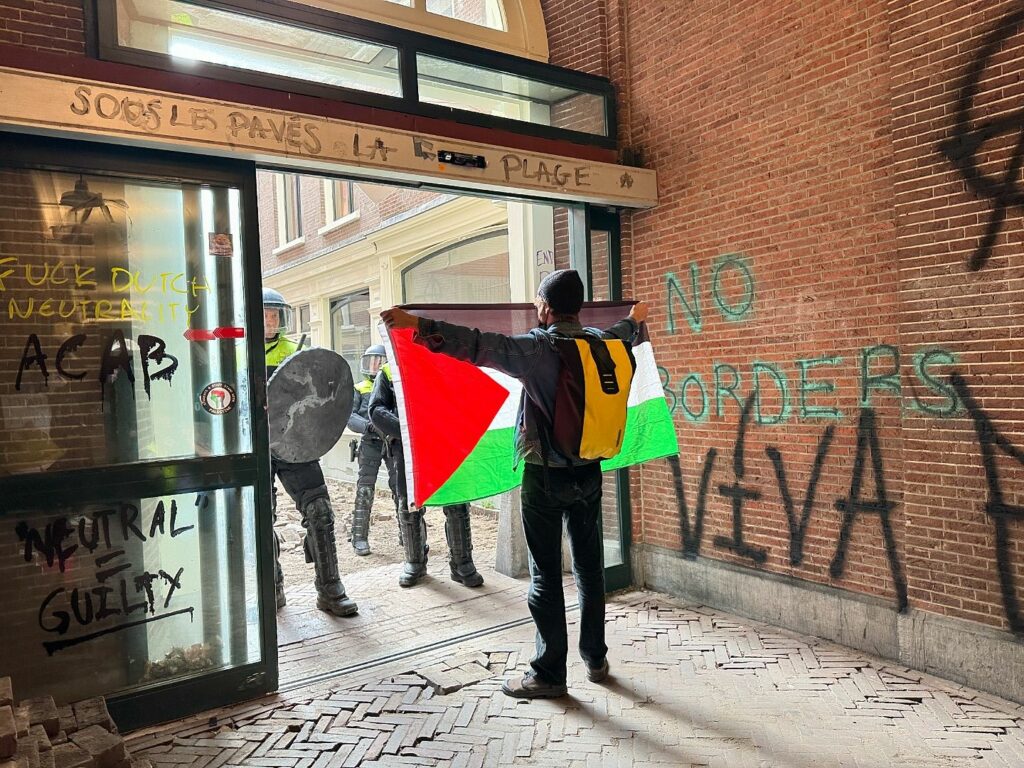Neither peaceful, nor de-escalating

We are a group of activists who were involved in the occupation of the Maagdenhuis in 2015. We see that the current pro-Palestine protests at UvA took off rapidly, but that the institutions and a part of the activist-movement are now openly calling for de-escalation. Behind this dynamic, we recognise a number of repressive tactics that caused great damage during the occupation of the Maagdenhuis. We would like to shine a light on this issue.
Divide and Conquer
As soon as the first signs of more disruptive forms of activism appear, everyone rushes to create a distinction between “peaceful protesters” and “non-peaceful protesters”. We saw this in 2015 and we are seeing it again now. This tactic attempts to criminalise disruptive forms of protest while pitting activists against each other.
The “peaceful protester’ is put on a pedestal. This protester is a well-meaning student! Their right to protest must be protected! The “non-peaceful protester” is dismissed as an anarchist, antifascist, non-student, or non-Dutch. For instance, in the charges against the Maagdenhuis-occupiers mentioned the presence of “most likely Moroccan boys’, who supposedly could not be students because of their background. This Other does not stand for anything, he just wants to riot! He is ruining it for the well-meaning students!
The “peaceful protesters” are put under as much pressure as possible. University administrators try to build relations with them, asking them if they can keep an eye on things and if they would be able to “de-escalate”. During the occupation of the Maagdenhuis, for example, the Executive Board secretly kept in contact with certain activists. The police (neighbourhood police, the Peace Unit) also actively seek contact in a similar way. For example, the Amsterdam chief of police describes how his Peace Unit has tried to build relations with students during the recent pro-Palestine actions in an attempt to “explain what is and is not allowed” and to de-escalate. Politicians, through various forms of media, continuously call on the protesters to “stay peaceful”, and journalists and institutions repeatedly ask the “peaceful protesters” to openly distance themselves from various groups and issues.
Meanwhile, “non-peaceful protesters” are isolated and incapacitated as much as possible. Both by stigmatisation and by more open repression in the form of arrests, immigrant detention (Maagdenhuis), demanding severe sentences (recent evictions of encampments), high penalty payments (Bungehuis), termination, and physical violence.
This strategy ensures that the pressure on all activists grows. Various institutions hope this will lead to tension, causing people to turn on each other and that “peaceful protesters” will take over the job of the police by passing on information to them and insisting on de-escalation.
Raising Barriers
After stressing in every possible way that the protests must be absolutely “peaceful”, the definition of peaceful becomes narrower and narrower. To give some examples: since 2015, occupations have been met with increasingly swift and violent evictions. Individual activists involved in the Maagdenhuis occupations were no longer allowed to even be in the vicinity of UvA open house days. The same thing is happening now. On the 12th of May, UvA sent an email stating that peaceful demonstrations are allowed, but expressly forbidding setting up an encampment, building barricades or wearing face-coverings. In other words: all of this is no longer considered peaceful. The list goes on. We have seen how time and again attempts are made to criminalise certain slogans. We have seen seated protesters demanding their standing fellow activists to sit down “because we are peaceful”.
As attempts are made to push more and more forms of activism into the realm of the indecent, more security is hired, more police are deployed, and more regulations are drawn up. Right now, universities are working on a new protocol for protests. The leeway for people who want to operate by the rules is increasingly reduced, while those who still want to act outside that narrow margin are more quickly confronted with state violence.
When covert repression gains a foothold and calls for de-escalation grow louder, the pressure on institutions to change will diminish. Additionally, divisions will deepen, and certain groups will become increasingly vulnerable to open repression. Therefore, we urge everyone to be aware of these repressive tactics and to resist them. This is not the time to de-escalate, but to escalate further. We do not strive for “peacefulness” and business as usual. We strive for a free Palestine, from the river to the sea.
(The orginal text in Dutch, “Noch vreedzaam, noch deëscalerend”, appeared on Verrep’s sustack on May 13th. Translation by Toros Dagman, and on May 15th perfected by the authors.)
